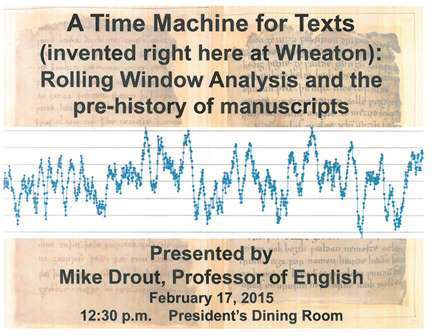A Time Machine for Texts is Invented at Wheaton: rolling window analysis and the pre-history of manuscripts
A new method of computer-assisted analysis, invented here at Wheaton, allows us to reconstruct the transmission histories of medieval manuscripts, recovering information that was thought to be forever lost. What we call “Rolling Window Analysis” uses subtle variations in the distribution of allographs (different letters used to represent the same sound) to identify sections of manuscripts that have sources or transmission histories different from those of the main body of the text. Correlating the rolling window analysis with study of the content and style of the texts allows us to see how they were created, copied and modified. The remarkable coincidence of a new archeological find confirming one of our most dramatic discoveries shows the value and potential of the techniques, which were developed collaboratively by students and faculty in the Lexomics Research Group. All are welcome to attend.
Presented by Mike Drout, Professor of English
Tuesday, February 17, 2015 at 12:30 pm
President’s Dining Room

-
Categories:
- Provost